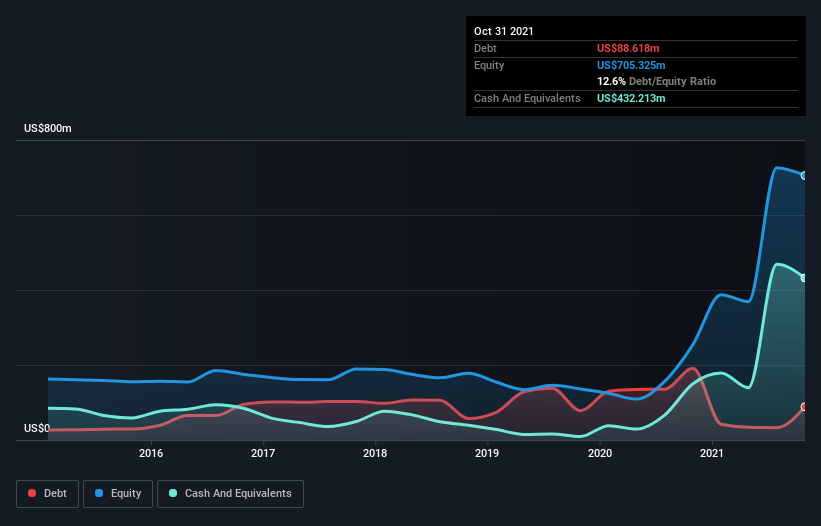Some say volatility, rather than debt, is the best way to think about risk as an investor, but Warren Buffett famously said that 'Volatility is far from synonymous with risk.' It's only natural to consider a company's balance sheet when you examine how risky it is, since debt is often involved when a business collapses. We note that FuelCell Energy, Inc. (NASDAQ:FCEL) does have debt on its balance sheet. But the real question is whether this debt is making the company risky.
When Is Debt Dangerous?
Generally speaking, debt only becomes a real problem when a company can't easily pay it off, either by raising capital or with its own cash flow. Part and parcel of capitalism is the process of 'creative destruction' where failed businesses are mercilessly liquidated by their bankers. However, a more frequent (but still costly) occurrence is where a company must issue shares at bargain-basement prices, permanently diluting shareholders, just to shore up its balance sheet. By replacing dilution, though, debt can be an extremely good tool for businesses that need capital to invest in growth at high rates of return. When we examine debt levels, we first consider both cash and debt levels, together.
View our latest analysis for FuelCell Energy
What Is FuelCell Energy's Debt?
The image below, which you can click on for greater detail, shows that FuelCell Energy had debt of US$88.6m at the end of October 2021, a reduction from US$191.2m over a year. However, its balance sheet shows it holds US$432.2m in cash, so it actually has US$343.6m net cash.

A Look At FuelCell Energy's Liabilities
We can see from the most recent balance sheet that FuelCell Energy had liabilities of US$52.8m falling due within a year, and liabilities of US$117.2m due beyond that. Offsetting this, it had US$432.2m in cash and US$23.7m in receivables that were due within 12 months. So it actually has US$285.9m more liquid assets than total liabilities.
This excess liquidity suggests that FuelCell Energy is taking a careful approach to debt. Given it has easily adequate short term liquidity, we don't think it will have any issues with its lenders. Succinctly put, FuelCell Energy boasts net cash, so it's fair to say it does not have a heavy debt load! The balance sheet is clearly the area to focus on when you are analysing debt. But ultimately the future profitability of the business will decide if FuelCell Energy can strengthen its balance sheet over time. So if you want to see what the professionals think, you might find this free report on analyst profit forecasts to be interesting.
In the last year FuelCell Energy's revenue was pretty flat, and it made a negative EBIT. While that's not too bad, we'd prefer see growth.
So How Risky Is FuelCell Energy?
We have no doubt that loss making companies are, in general, riskier than profitable ones. And in the last year FuelCell Energy had an earnings before interest and tax (EBIT) loss, truth be told. Indeed, in that time it burnt through US$144m of cash and made a loss of US$104m. Given it only has net cash of US$343.6m, the company may need to raise more capital if it doesn't reach break-even soon. Even though its balance sheet seems sufficiently liquid, debt always makes us a little nervous if a company doesn't produce free cash flow regularly. There's no doubt that we learn most about debt from the balance sheet. But ultimately, every company can contain risks that exist outside of the balance sheet. Be aware that FuelCell Energy is showing 3 warning signs in our investment analysis , you should know about...
At the end of the day, it's often better to focus on companies that are free from net debt. You can access our special list of such companies (all with a track record of profit growth). It's free.
New: AI Stock Screener & Alerts
Our new AI Stock Screener scans the market every day to uncover opportunities.
• Dividend Powerhouses (3%+ Yield)
• Undervalued Small Caps with Insider Buying
• High growth Tech and AI Companies
Or build your own from over 50 metrics.
Have feedback on this article? Concerned about the content? Get in touch with us directly. Alternatively, email editorial-team (at) simplywallst.com.
This article by Simply Wall St is general in nature. We provide commentary based on historical data and analyst forecasts only using an unbiased methodology and our articles are not intended to be financial advice. It does not constitute a recommendation to buy or sell any stock, and does not take account of your objectives, or your financial situation. We aim to bring you long-term focused analysis driven by fundamental data. Note that our analysis may not factor in the latest price-sensitive company announcements or qualitative material. Simply Wall St has no position in any stocks mentioned.
About NasdaqGM:FCEL
FuelCell Energy
Manufactures and sells stationary fuel cell and electrolysis platforms that decarbonize power and produce hydrogen.
Flawless balance sheet with low risk.
Similar Companies
Market Insights
Community Narratives


Recently Updated Narratives

Constellation Energy Dividends and Growth

CoreWeave's Revenue Expected to Rocket 77.88% in 5-Year Forecast

Bisalloy Steel Group will shine with a projected profit margin increase of 12.8%
Popular Narratives


MicroVision will explode future revenue by 380.37% with a vision towards success


NVDA: Expanding AI Demand Will Drive Major Data Center Investments Through 2026



